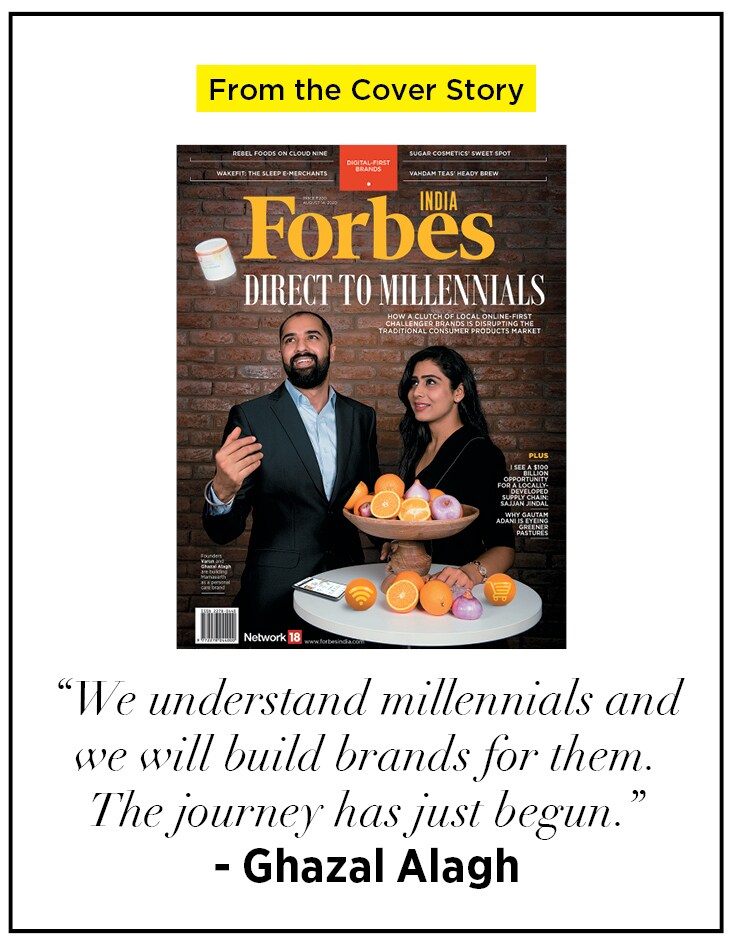
India is scripting a personal care story for millennials: Varun and Ghazal Alagh
In August 2020, the cofounders of Mamaearth were on the cover of our D2C special at a time when that market was at an inflection point, and the startup was taking baby steps in its transition to a personal care brand. Three years later, the maverick duo is busy building a house of brands for millennials
 Mamaearth co-founders Varun (right) and Ghazal Alagh
Image: Madhu Kapparath
Mamaearth co-founders Varun (right) and Ghazal Alagh
Image: Madhu Kapparath
In today’s fast-paced digital era, India has emerged as one of the strongest markets for personal care consumption, and millennials have emerged as a powerful consumer segment that cannot be ignored. Millennials have grown up in a world shaped by technology, connectivity, and instant access to information. Hence, digitisation has helped new brands break the clutter and establish themselves in the minds of the consumer. The real disruption in this segment came with digital allowing a brand to connect with its consumer directly, democratising the channel and presenting a plethora of options of new brands.
For years, Indian consumers have been geographically discriminated by physical distribution—most brands which were aspirational were limited to a handful of cities in India and expected consumers from Tier II and beyond to travel to these cities and purchase them. Today D2C (direct-to-consumer) and ecommerce have disrupted this distribution challenge by allowing a consumer from 25,000 PIN codes to fulfil their brand aspirations while sitting in the comfort of their homes.
As a market, we are moving away from a family consumption pattern to individual consumption, leading to a greater need for choice, and a wider opportunity for brand creation. Customers are far more experimental with the brand offerings today than ever before. In order to effectively build brands for millennials, it is crucial to understand their unique mindset and preferences.
Millennials value authenticity, purpose, and experiences over material possessions. They are more likely to support brands that align with their personal values, such as sustainability, social responsibility and inclusivity. Additionally, they crave personalisation and customisation along with seamless interactions across various touchpoints, both online and offline. Understanding that millennials today invest in ‘why’-based brands instead of ‘what’-based brands, we have created a ‘house of brands’ that is striving to build brands that cater to a wider purpose that has a lasting impact on society and goes beyond just the product and brand propositions.



 We intend to constantly learn and further refine our personalisation engine to deliver a more tailored, contextualised experience to our users, deepen brand connect and drive consumer retention and repeat. For instance, our ability to integrate technology with our purpose-driven initiatives such as geo-tracking of the trees planted under our Plant Goodness initiative enables visibility and transparency for our consumers and strengthens trust. We have launched a strong purpose for each brand that is core to its proposition and helps add value to the lives of customers and the people it impacts.
We intend to constantly learn and further refine our personalisation engine to deliver a more tailored, contextualised experience to our users, deepen brand connect and drive consumer retention and repeat. For instance, our ability to integrate technology with our purpose-driven initiatives such as geo-tracking of the trees planted under our Plant Goodness initiative enables visibility and transparency for our consumers and strengthens trust. We have launched a strong purpose for each brand that is core to its proposition and helps add value to the lives of customers and the people it impacts. 



